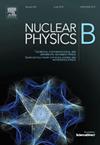Complexity of quantum-mechanical evolutions from probability amplitudes
IF 2.5
3区 物理与天体物理
Q2 PHYSICS, PARTICLES & FIELDS
引用次数: 0
Abstract
We study the complexity of both time-optimal and time sub-optimal quantum Hamiltonian evolutions connecting arbitrary source and a target states on the Bloch sphere equipped with the Fubini-Study metric. This investigation is performed in a number of steps. First, we describe each unitary Schrödinger quantum evolution by means of the path length, the geodesic efficiency, the speed efficiency, and the curvature coefficient of its corresponding dynamical trajectory linking the source state to the target state. Second, starting from a classical probabilistic setting where the so-called information geometric complexity can be employed to describe the complexity of entropic motion on curved statistical manifolds underlying the physics of systems when only partial knowledge about them is available, we transition into a deterministic quantum setting. In this context, after proposing a definition of the complexity of a quantum evolution, we present a notion of quantum complexity length scale. In particular, we discuss the physical significance of both quantities in terms of the accessed (i.e., partial) and accessible (i.e., total) parametric volumes of the regions on the Bloch sphere that specify the quantum mechanical evolution from the source to the target states. Third, after calculating the complexity measure and the complexity length scale for each one of the two quantum evolutions, we compare the behavior of our measures with that of the path length, the geodesic efficiency, the speed efficiency, and the curvature coefficient. We find that, in general, efficient quantum evolutions are less complex than inefficient evolutions. However, we also observe that complexity is more than length. Indeed, longer paths that are sufficiently bent can exhibit a behavior that is less complex than that of shorter paths with a smaller curvature coefficient.
从概率振幅看量子力学演化的复杂性
我们研究了布洛赫球上连接任意源态和目标态的时间最优和时间次优量子哈密顿演化的复杂性。这项研究分几个步骤进行。首先,我们通过连接源态和目标态的相应动力学轨迹的路径长度、大地效率、速度效率和曲率系数来描述每一个单元薛定谔量子演化。其次,我们从经典的概率论环境出发,利用所谓的信息几何复杂性来描述在只有部分知识的情况下,系统物理学所依据的曲线统计流形上的熵运动的复杂性,然后过渡到确定性量子环境。在此背景下,在提出量子演化复杂性的定义之后,我们提出了量子复杂性长度标度的概念。特别是,我们从布洛赫球上指定从源态到目标态的量子力学演化的区域的已获取(即部分)和可获取(即总)参数体积的角度,讨论了这两个量的物理意义。第三,在分别计算了两种量子演化的复杂度和复杂度长度尺度之后,我们将复杂度与路径长度、大地效率、速度效率和曲率系数的行为进行了比较。我们发现,一般来说,高效量子演化的复杂性低于低效演化。不过,我们也观察到,复杂性不仅仅在于长度。事实上,与曲率系数较小的较短路径相比,弯曲程度足够大的较长路径所表现出的行为复杂度较低。
本文章由计算机程序翻译,如有差异,请以英文原文为准。
求助全文
约1分钟内获得全文
求助全文
来源期刊

Nuclear Physics B
物理-物理:粒子与场物理
CiteScore
5.50
自引率
7.10%
发文量
302
审稿时长
1 months
期刊介绍:
Nuclear Physics B focuses on the domain of high energy physics, quantum field theory, statistical systems, and mathematical physics, and includes four main sections: high energy physics - phenomenology, high energy physics - theory, high energy physics - experiment, and quantum field theory, statistical systems, and mathematical physics. The emphasis is on original research papers (Frontiers Articles or Full Length Articles), but Review Articles are also welcome.
 求助内容:
求助内容: 应助结果提醒方式:
应助结果提醒方式:


